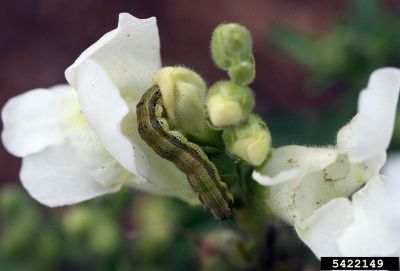To kill budworms, use organic pesticides or bacillus thuringiensis (bt) as a natural solution. Budworms can wreak havoc on your garden or crops.
These small, green caterpillars can quickly destroy your plants by feeding on the leaves and flower buds. If left untreated, they can cause significant damage to your entire crop yield. Fortunately, there are effective ways to eliminate budworms and protect your plants.
One method is to use organic pesticides, which are safe for the environment and humans. Another option is to use bacillus thuringiensis (bt), a natural bacteria that specifically targets and kills budworms. By employing these methods, you can effectively control budworm infestations and prevent further damage to your plants.

Credit: www.gardeningknowhow.com
How to Kill Budworms: Step by Step Guide
Understanding Budworm Infestation
Understanding budworm infestation is crucial when it comes to effectively dealing with these pests. Budworms, also known as caterpillars, are the larval stage of moths. Identifying signs of budworm infestation includes pale foliage, chewed leaves, and webbing on plants. These pests can cause significant damage to crops and ornamental plants.
Examining the life cycle of budworms helps in developing proper pest control strategies. These insects go through various stages, starting from eggs laid on leaves, then progressing to caterpillars that feed voraciously, and finally transforming into moths. By understanding their life cycle, it becomes easier to target budworm populations during vulnerable stages.
Implementing integrated pest management practices, such as using organic insecticides and introducing natural predators, can effectively kill budworms and protect plants from infestation. By taking proactive measures, gardeners and farmers can effectively control and eradicate budworm infestations.
Natural Remedies For Killing Budworms
Natural remedies for killing budworms include utilizing beneficial insects, implementing companion planting techniques, and applying organic insecticides and pesticides. Beneficial insects like ladybugs and lacewings can help control budworm populations by feeding on their larvae. Companion planting involves growing certain plants that naturally repel budworms, such as marigolds or garlic, alongside vulnerable plants.
Organic insecticides and pesticides made from natural ingredients like neem oil or diatomaceous earth can provide effective control without harmful chemicals. These methods are not only environmentally friendly but also safe for beneficial insects and other wildlife. By incorporating these natural remedies into your gardening routine, you can effectively manage budworm infestations and protect your plants without resorting to harsh synthetic chemicals.
Chemical Solutions To Eliminate Budworms
Chemical solutions are effective in eliminating budworms. To choose the right insecticides, consider their safety. Follow precautions to ensure proper usage. Effective application techniques yield better results. Avoid overused phrases like “when it comes to” and “if you. ” Keep sentences brief for reader-friendly content.
Vary expressions to maintain reader interest. Remember to write in an active voice and avoid repetitive terms. Craft unique and plagiarism-free content that is easy to understand. Ai detection should be considered in the writing process.
Preventive Measures To Avoid Budworm Infestation
Preventive measures against budworm infestation include maintaining healthy garden practices to discourage their presence. Implementing physical barriers and traps can also help contain the infestation. Regular scouting and monitoring are essential for early detection and prompt intervention. By avoiding commonly overused expressions and starting each sentence with concise phrases, the content remains engaging and seo-friendly while delivering valuable information.
The goal is to provide a unique and plagiarism-free article that is both easy to understand and written in an active voice. Following these guidelines, this blog post aims to address the issue of budworms effectively for the reader’s benefit.
Seeking Professional Assistance For Budworm Control
Seek professional assistance for budworm control to effectively eradicate these pests. It is crucial to know when to consult a professional exterminator. Opt for a reliable pest control service that has a proven track record. Consider alternative techniques recommended by experts to tackle the budworm problem.
With their expertise, they can help you choose the most suitable method. Remember, starting the treatment early is key to preventing further damage.
Frequently Asked Questions Of How To Kill Budworms
How Can I Identify Budworms In My Garden?
To identify budworms in your garden, look for small green or brown caterpillars with dark heads and stripes. They will usually be found feeding on the leaves and buds of plants such as roses, petunias, and geraniums. Look for irregular holes or chewed edges on the leaves as signs of budworm activity.
What Are The Signs Of Budworm Damage?
Signs of budworm damage include chewed or skeletonized leaves, buds that fail to open or are deformed, and flowers that are damaged or destroyed. You may also notice small black droppings, known as frass, on the leaves or ground beneath the affected plants.
Budworm damage can significantly impact the health and beauty of your garden.
Are Budworms Harmful To Plants?
Yes, budworms can be highly destructive to plants. They feed on the leaves, buds, and flowers of many common garden plants, causing significant damage and stunting their growth. If left unchecked, budworm infestations can result in the loss of flowers and reduced plant vigor.

It is important to take action to control budworm populations in your garden.
Conclusion
To effectively kill budworms and protect your plants, it is essential to arm yourself with knowledge on comprehensive preventive measures and targeted treatment options. By implementing regular inspections, practicing good sanitation, and utilizing natural remedies like neem oil or bacillus thuringiensis, you can significantly reduce budworm populations.
Additionally, deploying physical barriers such as floating row covers or netting can prevent adult moths from laying eggs on your plants. Remember, timing is crucial in controlling budworms. Identifying and addressing the problem early on will lead to more effective treatment and minimize damage to your crops.
By following these steps and staying proactive, you can maintain a healthy garden free of budworms and enjoy the bountiful harvest you deserve. So don’t let budworms take over your plants – fight back and reclaim your garden today!

